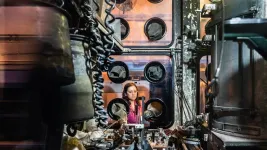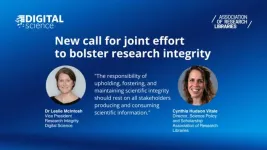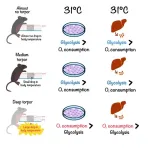(Press-News.org) Engineers from the U.S. Department of Energy’s (DOE) Argonne National Laboratory are collaborating on nine projects awarded to universities under the DOE’s Nuclear Energy University Program (NEUP) and Integrated Research Projects.
The projects were selected as part of DOE’s commitment to investing in nuclear energy technologies, universities and the development of the next generation of researchers and scientists. These projects will play a vital role in advancing nuclear technology, supporting early career faculty research activities and fostering student innovation at Argonne and academic institutions across the nation.
DOE recently allocated more than $56 million for nuclear energy and student innovation awards to be distributed among 68 projects nationwide. These initiatives aim to support the research and development of nuclear technology, contribute to the expansion of access to nuclear energy and accelerate progress toward achieving the nation’s net-zero emissions goal by 2050. The awarded projects cover a wide range of areas, including advanced reactor concepts, materials research, nuclear fuel cycle systems and nuclear safety.
Argonne’s engineers are thrilled to have the opportunity to collaborate with esteemed colleagues from universities and national laboratories across the country. This collaborative effort will bring together multidisciplinary teams to address complex challenges and drive innovation in the field of nuclear energy. The awarded projects include:
Reference Designs of Carbon-free Ammonia Plants Powered by Small Modular Reactors (Utah State University, Argonne engineer Pingping Sun)
A Low Order Transport Method Based on the Dynamic Truncation of the Integral Transport Matrix Method (ITMM) that Converges to the SN Solution with Increasing Cell Optical Thickness (North Carolina State University, Argonne engineer Changho Lee)
Development of a Thin-Layer Electrochemical Sensor for Molten Salt Reactors and Fuel Cycle Processes (Brigham Young University, Argonne engineer Krista Hawthorne)
Subwavelength Ultrasonic Imaging for Rapid Qualification of Additively Manufactured Nuclear Structures and Components (University of Michigan, Argonne engineers Alexander Heifetz and Bogdan Alexandreanu)
Reduced Order Modeling of Heat and Fluid Flow: Multi-Scale Modeling of Advanced Reactors to Enable Faster Deployment (University of Illinois, Urbana-Champaign, Argonne engineer Dillon Shaver)
Optical Sensors for Impurity Measurement in Liquid Metal-cooled Fast Reactors (University of Michigan, Argonne engineer Teddy Kent)
Mechanisms-based Acceleration of Materials Qualifications for Creep-Fatigue Performance in Advanced Nuclear Systems (University of Illinois, Urbana-Champaign, Argonne engineer Xuan Zhang)
Immersed Boundary Methods for Modeling of Complex Geometry: A Leap Forward in Multiscale Modeling using NekRS (University of Illinois, Urbana-Champaign, Argonne engineer Dillon Shaver)
Exascale Simulation of Thermal-Hydraulics Phenomena in Advanced Reactors and Validation Using High Resolution Experimental Data (City College of New York, Argonne computational scientist Saumil Patel)
“These awards are a crucial investment in our nation’s nuclear energy technologies, universities, and next generation of researchers and scientists,” said DOE’s Office of Nuclear Energy’s Assistant Secretary Kathryn Huff. “The funding will help ensure researchers and educators have the resources they need to keep making a difference.”
Since 2009, DOE’s Office of Nuclear Energy has granted over $992 million to propel nuclear energy research forward and train the future leaders of the industry.
Argonne National Laboratory seeks solutions to pressing national problems in science and technology. The nation’s first national laboratory, Argonne conducts leading-edge basic and applied scientific research in virtually every scientific discipline. Argonne researchers work closely with researchers from hundreds of companies, universities, and federal, state and municipal agencies to help them solve their specific problems, advance America’s scientific leadership and prepare the nation for a better future. With employees from more than 60 nations, Argonne is managed by UChicago Argonne, LLC for the U.S. Department of Energy’s Office of Science.
The U.S. Department of Energy’s Office of Science is the single largest supporter of basic research in the physical sciences in the United States and is working to address some of the most pressing challenges of our time. For more information, visit https://energy.gov/science.
END
Argonne researchers power up: Co-awarded 9 nuclear projects from Department of Energy
New projects will advance nuclear technologies
2023-08-17
ELSE PRESS RELEASES FROM THIS DATE:
Policy to expand Medicaid coverage linked to higher participation in cancer clinical trials among people insured by Medicaid
2023-08-17
SEATTLE – AUGUST 17, 2023 – The Medicaid expansion under the Patient Protection and Affordable Care Act resulted in a 19% annual increase in Medicaid-insured cancer patients participating in publicly funded clinical trials, according to researchers from Fred Hutchinson Cancer Center, the SWOG Statistics and Data Management Center and Columbia University.
Published in JAMA Oncology, the study explored the impact of Medicaid expansion in 2014 and 2015 on cancer clinical trial participation. Researchers found that the 19% annual increase, compounded over time, resulted in 52% more patients with Medicaid insurance participating ...
New call for joint effort to bolster research integrity
2023-08-17
Who’s responsible for upholding research integrity, mitigating misinformation or disinformation and increasing trust in research? Everyone – even those reporting on research – says a new article published by leading research integrity experts.
In their paper published in the journal Frontiers in Research Metrics and Analytics, Dr Leslie McIntosh (Vice President Research Integrity, Digital Science) and Ms Cynthia Hudson Vitale (Director, Science Policy and Scholarship, Association of Research Libraries) call for improved policies and worldwide coordination between funding bodies, publishers, academic institutions, scholarly ...
New UCF project examines key role soils play in keeping the planet cool
2023-08-17
UNIVERSITY OF CENTRAL FLORIDA
New UCF Project Examines Key Role Soils Play in Keeping the Planet Cool
The research, funded by a grant from the USDA National Institute of Food and Agriculture, will examine a method to keep carbon from escaping soils and trapping heat in Earth’s atmosphere.
ORLANDO, Aug.17, 2023 – A new project from the University of Central Florida is looking to the soils for a way to cool the skies.
Funded by a nearly $750,000 grant from the USDA National Institute of Food and Agriculture, the research will examine a method to keep carbon from escaping soils and ...
Rotman professors and Ph.D. students honored at academic conferences
2023-08-17
August 17, 2023
Rotman Professors and PhD Students Honoured at Academic Conferences
Toronto – Faculty and doctoral students at the University of Toronto’s Rotman School of Management were honoured at recent academic conferences for their research and contributions.
At the annual meeting of the American Accounting Association last week in Denver, Jee-Eun Shin, an assistant professor of accounting, received the Best Early Career Researcher in Management Accounting Award sponsored by the Association of International Certified Professional Accountants. ...
University of Colorado data researchers connect diet to changes in the microbiome
2023-08-17
“Should I be taking a probiotic?” is a question that Maggie Stanislawski, PhD, assistant professor in the University of Colorado Department of Biomedical Informatics (DBMI), gets asked often.
The answer is complicated. Every person’s gut microbiome is unique, and many probiotic supplements sold in grocery stores may not effectively bolster gut health for everyone, she says. The researcher, who specializes in the role of the gut microbiome in obesity and cardiometabolic disease, instead points to the importance ...
Largest genetic study of brain structure identifies how the brain is organised
2023-08-17
The largest ever study of the genetics of the brain – encompassing some 36,000 brain scans – has identified more than 4,000 genetic variants linked to brain structure. The results of the study, led by researchers at the University of Cambridge, are published in Nature Genetics today.
Our brains are very complex organs, with huge variety between individuals in terms of the overall volume of the brain, how it is folded and how thick these folds are. Little is known about how our genetic make-up shapes the development of the brain.
To answer this question, a team led by researchers at the Autism Research ...
Discovery of chikungunya virus’s “invisibility shield” may lead to vaccines or treatments
2023-08-17
August 17, 2023—(BRONX, NY)—Researchers at Albert Einstein College of Medicine have found that the virus responsible for chikungunya fever can spread directly from cell to cell—perhaps solving the longstanding mystery of how the virus, now emerging as a major health threat, can manage to escape antibodies circulating in the bloodstream. The findings, published today in Nature Microbiology, could help in developing effective vaccines or treatments for chikungunya fever, a debilitating and increasingly common mosquito-borne disease.
A Possible Explanation ...
Immunotherapy drug combo helps extend the lives of patients with metastatic melanoma
2023-08-17
A research team co-led by UCLA investigators has shown that an immunotherapy drug combination can be an effective second-line therapy for patients with an aggressive and deadly type of melanoma that is resistant to the widely used immunotherapy drugs known as PD-1 inhibitors.
In clinical trials, the investigators found that the combination therapy can extend the amount of time patients live without their cancer worsening, known as progression-free survival, and helps overcome resistance to prior immunotherapies, allowing more patients to benefit from the treatment.
The ...
Towards organ preservation: Animal resistance to cold reflected in stem cells
2023-08-17
Researchers led by Genshiro Sunagawa at the RIKEN Center for Biosystems Dynamics Research (BDR) in Japan have shown that an animal’s stem cells possess the same level of cold resistance as the animal itself. Published August 17 in Cell Reports, the study focuses on mice with different hibernation-like characteristics, showing that those with the best resistance to cold temperatures have stems cells that generate energy differently than others. Beyond these immediate findings, the study establishes mouse stem cells as a practical model ...
Anti-obesity drug improves associative learning in people with obesity
2023-08-17
To control our behaviour, the brain must be able to form associations. This involves, for example, associating a neutral external stimulus with a consequence following the stimulus (e.g., the hotplate glows red - you can burn your hand). In this way, the brain learns what the implication of our handling of the first stimulus are. Associative learning is the basis for forming neural connections and gives stimuli their motivational force. It is essentially controlled by a brain region called the dopaminergic midbrain. This region ...
LAST 30 PRESS RELEASES:
Study reveals insights about brain regions linked to OCD, informing potential treatments
Does ocean saltiness influence El Niño?
2026 Young Investigators: ONR celebrates new talent tackling warfighter challenges
Genetics help explain who gets the ‘telltale tingle’ from music, art and literature
Many Americans misunderstand medical aid in dying laws
Researchers publish landmark infectious disease study in ‘Science’
New NSF award supports innovative role-playing game approach to strengthening research security in academia
Kumar named to ACMA Emerging Leaders Program for 2026
AI language models could transform aquatic environmental risk assessment
New isotope tools reveal hidden pathways reshaping the global nitrogen cycle
Study reveals how antibiotic structure controls removal from water using biochar
Why chronic pain lasts longer in women: Immune cells offer clues
Toxic exposure creates epigenetic disease risk over 20 generations
More time spent on social media linked to steroid use intentions among boys and men
New study suggests a “kick it while it’s down” approach to cancer treatment could improve cure rates
Milken Institute, Ann Theodore Foundation launch new grant to support clinical trial for potential sarcoidosis treatment
New strategies boost effectiveness of CAR-NK therapy against cancer
Study: Adolescent cannabis use linked to doubling risk of psychotic and bipolar disorders
Invisible harms: drug-related deaths spike after hurricanes and tropical storms
Adolescent cannabis use and risk of psychotic, bipolar, depressive, and anxiety disorders
Anxiety, depression, and care barriers in adults with intellectual and developmental disabilities
Study: Anxiety, gloom often accompany intellectual deficits
Massage Therapy Foundation awards $300,000 research grant to the University of Denver
Gastrointestinal toxicity linked to targeted cancer therapies in the United States
Countdown to the Bial Award in Biomedicine 2025
Blood marker from dementia research could help track aging across the animal world
Birds change altitude to survive epic journeys across deserts and seas
Here's why you need a backup for the map on your phone
ACS Central Science | Researchers from Insilico Medicine and Lilly publish foundational vision for fully autonomous “Prompt-to-Drug” pharmaceutical R&D
Increasing the number of coronary interventions in patients with acute myocardial infarction does not appear to reduce death rates
[Press-News.org] Argonne researchers power up: Co-awarded 9 nuclear projects from Department of EnergyNew projects will advance nuclear technologies



